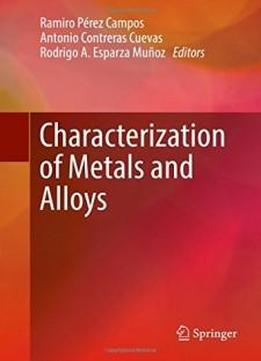
Characterization Of Metals And Alloys
by Antonio Contreras Cuevas /
2016 / English / PDF
10.3 MB Download
This book covers various aspects of characterization of materials
in the areas of metals, alloys, steels, welding, nanomaterials,
intermetallic, and surface coatings. These materials are obtained
by different methods and techniques like spray, mechanical
milling, sol-gel, casting, biosynthesis, and chemical reduction
among others. Some of these materials are classified according to
application such as materials for medical application, materials
for industrial applications, materials used in the oil industry
and materials used like coatings. The authors provide a
comprehensive overview of structural characterization techniques
including scanning electron microscopy (SEM), X-ray diffraction
(XRD), transmission electron microscopy (TEM), Raman
spectroscopy, image analysis, finite element method (FEM),
optical microscopy (OM), energy dispersive spectroscopy
(EDS), Fourier transform infrared spectroscopy (FTIR),
differential thermal analysis (DTA), differential scanning
calorimetry (DSC), ultraviolet–visible spectroscopy (UV-Vis),
infrared photo-thermal radiometry (IPTR), electrochemical
impedance spectroscopy (EIS), thermogravimetry analysis (TGA),
thermo luminescence (TL), photoluminescence (PL), high resolution
transmission electron microscopy (HRTEM), and radio frequency
(RF). The book includes theoretical models and illustrations of
characterization properties―both structural and chemical.
This book covers various aspects of characterization of materials
in the areas of metals, alloys, steels, welding, nanomaterials,
intermetallic, and surface coatings. These materials are obtained
by different methods and techniques like spray, mechanical
milling, sol-gel, casting, biosynthesis, and chemical reduction
among others. Some of these materials are classified according to
application such as materials for medical application, materials
for industrial applications, materials used in the oil industry
and materials used like coatings. The authors provide a
comprehensive overview of structural characterization techniques
including scanning electron microscopy (SEM), X-ray diffraction
(XRD), transmission electron microscopy (TEM), Raman
spectroscopy, image analysis, finite element method (FEM),
optical microscopy (OM), energy dispersive spectroscopy
(EDS), Fourier transform infrared spectroscopy (FTIR),
differential thermal analysis (DTA), differential scanning
calorimetry (DSC), ultraviolet–visible spectroscopy (UV-Vis),
infrared photo-thermal radiometry (IPTR), electrochemical
impedance spectroscopy (EIS), thermogravimetry analysis (TGA),
thermo luminescence (TL), photoluminescence (PL), high resolution
transmission electron microscopy (HRTEM), and radio frequency
(RF). The book includes theoretical models and illustrations of
characterization properties―both structural and chemical.











